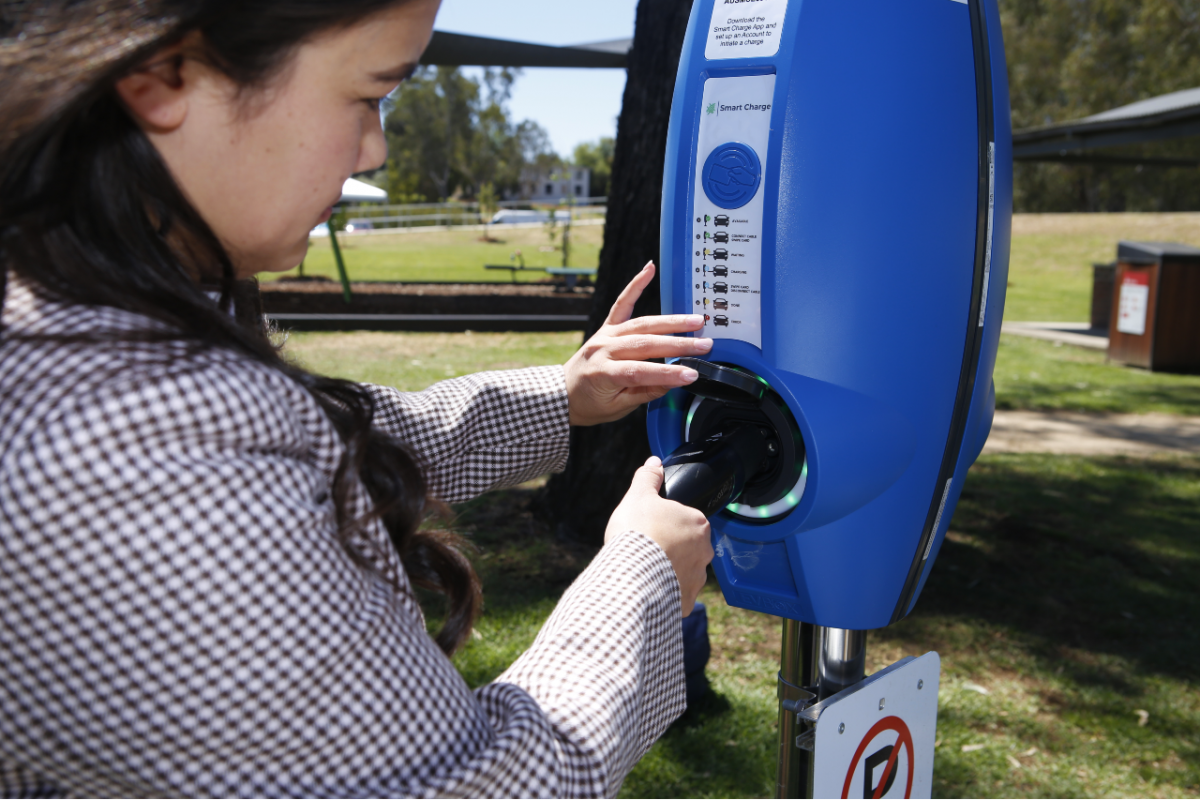Greenhouse gas emissions from the use of transportation account for 31 per cent of the total community emissions in the Wagga Wagga LGA. It is the second highest source of emissions in the LGA after energy usage (52 per cent). The key reason for this is the heavy use of fossil fuels like gas, petrol and diesel in cars, trucks, trains and airplanes.
The other significant reason behind this figure is the human behavior of using transportation methods. Using vehicles for very short distances, doing unnecessary travels, using inefficient combustion engines, single occupancy travels and inefficient driving techniques like aggressive acceleration are few examples of these behaviors.

Electric vehicles
Electric vehicles (EVs) refer to the vehicles that are powered and operated by electricity rather than fossil fuels. They are considered more environmentally friendly than traditional vehicle types because of less or no emissions and dependency on renewable energy sources.
The popularity of electric vehicles is increasing due to their constant evolution in range, charging infrastructure and affordability.
There are currently four types of EVs available in the market:
- Battery Electric Vehicles (BEVs): fully electric, also known as ‘plug in’ EVs, which use electricity to charge the battery that powers the vehicle
- Plug-in hybrid electric vehicles (PHEVs): partially electric and powered by both electricity and fossil fuels. Uses plug-in technology to recharge the battery
- Fuel cell electric vehicles (FCEVs): uses a fuel cell instead of battery. A fuel cell is a device that generates electricity through an electrochemical reaction instead of combustion, typically fueled by hydrogen
- Hybrid electric vehicles (HEVs): powered by a combination of fossil fuel and battery. Uses regenerative braking system to recharge the battery
There are huge benefits that comes along with EVs and development of EV infrastructure. Some of the key benefits include;
- Cost savings: EVs are much cheaper to run compared to internal combustion engines and also have less maintenance costs due to fewer moving parts.
- Flexibility and convenience: Additional EV chargers will offer higher flexibility and convenience to people wanting to plan their journey in and out of the town.
- Local business boost: EV owners can enjoy different activities around the town while their EVs are being charged, which in turn helps local businesses.
- A healthier environment: When supplied by renewable energy, EVs have zero tailpipe emissions which means lower greenhouse gases and reducing air pollution, leading to a cleaner and healthier environment.
How is Council supporting take-up of sustainable transport?
Wagga Wagga City Council has introduced electric vehicles (EV) to its fleet, adding three MG ZS Excite electric vehicles for staff to use across the organisation. These vehicles produce zero emissions and have reduced emissions from charging because of the solar panels installed on the Civic Centre building. The initiative to go electric is in line with the Corporate Net Zero Emissions 2040 Strategy adopted by Council in June 2022.
Development of EV infrastructure has been growing in abundance around Wagga Wagga LGA. Council has installed five EV chargers with support of NSW Destination EV Charging grant program.
The chargers are strategically placed at popular visitor locations including the Visitor Information Centre, Civic Centre, Bolton Park, Apex Park, and Museum of Riverina Botanic Gardens site where visitors may tend to go.
While the target user group is tourists travelling to or through our region, the chargers are also open to any community members that might want to use them.
Council continues to educate and increase awareness about the benefits of EVs and how helpful they are in contributing towards the NSW and Community Net Zero target of 2050.
One of the most common barriers to EV uptake is a lack of chargers and range anxiety, and Council is directly helping to address that. Council also encourages the community to look at EVs as an option by providing information about available grants and rebates from State and Federal Government to help community members to make an informed decision before making the switch.
How to find an Electric Charging Station?
The Plug Share Map displays all charging stations installed across the nation. Users can search various locations and get all the details about the charging station.
PlugShare - EV Charging Station Map - Find a place to charge your car!
Related Information
